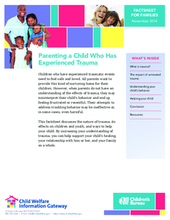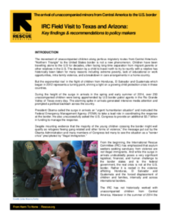This page contains documents and other resources related to children's care in the Americas. Browse resources by region, country, or category.
Displaying 2871 - 2880 of 3191
This factsheet discusses the nature of trauma, its effects on children and youth, and ways to help your child.
Using the accumulated wisdom of a select group of accomplished managers, academics and policy makers in social work and social care, this paper retrospectively reviews the evolution of Family Support within the Irish context and distils the core characteristics of Family Support practice and service delivery.
This Strategic Paper, from the Igarapé Institute, reviews emerging capabilities of information and communication technologies (ICTs) to prevent violence against children in the Global South.
"Strengthening Work with Children and Families Affected by Family Violence – From Theory to Practice"
This report, informed by a field study conducted by the International Rescue Committee, provides a summary of findings and presents recommendations aimed at helping policy makers to improve the current and future response to the arrival of unaccompanied children from Central America to the United States.
The Communications Manager will be responsible for supporting the Global Social Service Workforce Alliance in developing and deploying strategies to communicate with and engage Alliance members and external audiences.
This article assesses the evidence-based programs that are most likely to improve key health and well-being outcomes for teenage mothers in the United States and yields a list that reflects the best evidence for efficacy and effectiveness.
This paper presents the findings of an exploratory research study of foster care youth residing in group homes in a mid-Atlantic state in the USA.
The USA branch of International Social Service is hosting its 5th annual conference on Developing Child-Centered Practice in Law, Social Work, and Policy for Cross-Border Families on Thursday October 2, 2014 from 8:30am to 5:30pm.
SAVE THE DATE! Wednesday September 24th 2014, New York City





